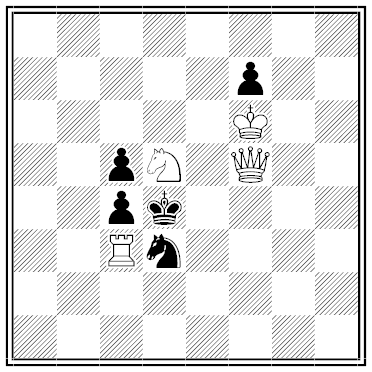Mount Everest rises 29,029 feet above sea level, and Ecuador’s volcano Chimborazo rises only 20,702 feet. But because Earth bulges at the equator, Chimborazo is actually farther from the center of the planet. If we could connect the two peaks with a water pipe, in which direction would the water flow?
Wheels of Chance
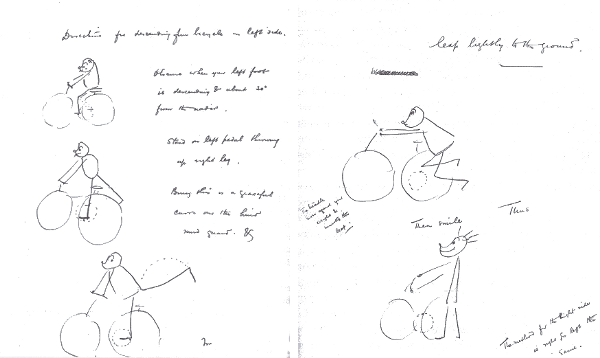
H.G. Wells demonstrates how to dismount a bicycle, June 1895:
“Observe when your left foot is descending & about 30° from the nadir. Stand on left pedal throwing up right leg. Bring this in a graceful curve over the hind mud guard & leap lightly to the ground. The treadle moves against your weight & assists the leap. Then smile. Thus.”
That’s from a letter to an old college friend. “The bicycle in those days was still very primitive,” Wells recalled of the bicycle craze of the 1890s. “The diamond frame had appeared but there was still no freewheel. You could only stop and jump off when the treadle was at its lowest point, and the brake was an uncertain plunger upon the front wheel. … Nevertheless the bicycle was the swiftest thing upon the roads in those days … and the cyclist had a lordliness, a sense of masterful adventure, that has gone from him altogether now.”
“I learnt to ride my bicycle upon sandy tracks with none but God to help me; he chastened me considerably in the process.”
Math Notes
From Pedro A. Pisa in Scripta Mathematica, September 1954 — this identity:
1234 + 2484 + 3674 = 1254 + 2444 + 3694
… remains valid when the digits in each term are permuted in the same way:
1234 + 2484 + 3674 = 1254 + 2444 + 3694
1243 + 2448 + 3647 = 1245 + 2444 + 3649
1324 + 2844 + 3764 = 1524 + 2444 + 3964
1342 + 2844 + 3746 = 1542 + 2444 + 3946
1423 + 2448 + 3467 = 1425 + 2444 + 3469
1432 + 2484 + 3476 = 1452 + 2444 + 3496
2134 + 4284 + 6374 = 2154 + 4244 + 6394
2143 + 4248 + 6347 = 2145 + 4244 + 6349
2314 + 4824 + 6734 = 2514 + 4424 + 6934
2341 + 4842 + 6743 = 2541 + 4442 + 6943
2413 + 4428 + 6437 = 2415 + 4424 + 6439
2431 + 4482 + 6473 = 2451 + 4442 + 6493
3124 + 8244 + 7364 = 5124 + 4244 + 9364
3142 + 8244 + 7346 = 5142 + 4244 + 9346
3214 + 8424 + 7634 = 5214 + 4424 + 9634
3241 + 8442 + 7643 = 5241 + 4442 + 9643
3412 + 8424 + 7436 = 5412 + 4424 + 9436
3421 + 8442 + 7463 = 5421 + 4442 + 9463
4123 + 4248 + 4367 = 4125 + 4244 + 4369
4132 + 4284 + 4376 = 4152 + 4244 + 4396
4213 + 4428 + 4637 = 4215 + 4424 + 4639
4231 + 4482 + 4673 = 4251 + 4442 + 4693
4312 + 4824 + 4736 = 4512 + 4424 + 4936
4321 + 4842 + 4763 = 4521 + 4442 + 4963
And everything above holds true if each term is squared.
Clearing the Air
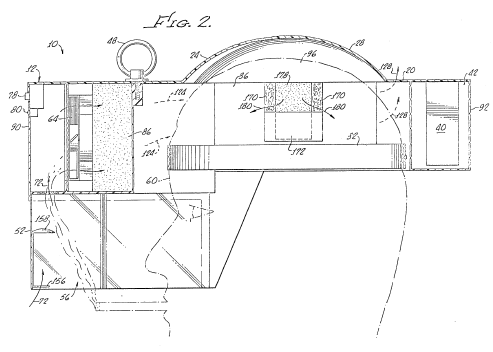
With the “smoker’s hat,” patented by Walter Netschert in 1989, you can finally interact with nonsmokers without giving offense. A visor will intercept your smoke and direct it to a filter, and you can add a clip to hold the cigarette and a cup to catch ashes so that there are no waste products. The exhaust can even be scented.
This seems like a lot of trouble, but for some it’s worth it. “When I don’t smoke I scarcely feel as if I’m living,” wrote Russell Hoban in Turtle Diary. “I don’t feel as if I’m living unless I’m killing myself.”
A Foreign Tongue
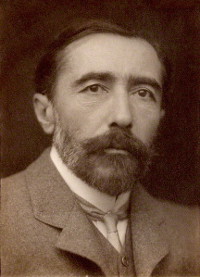
English was Joseph Conrad’s third language. Born in Poland, he learned French as a child but heard no English until he went to sea as a teenager. In 1874 he had just rowed a dinghy alongside an English cargo steamer at Marseilles when a deck hand threw him a rope and called, “Look out there.” “For the very first time in my life, I heard myself addressed in English — the speech of my secret choice, of my future, of long friendships of the deepest affections, of hours of toil and hours of ease, and of solitary hours too, of books read, of thoughts pursued, of remembered emotions — of my very dreams!”
His captivation with the language, he would later say, was “too mysterious to explain,” “a subtle and unforeseen accord of my emotional nature with its genius.” He made his way to England and began to puzzle out newspaper articles with help from a local boat builder. “I began to think in English long before I mastered, I won’t say the style (I haven’t done that yet), but the mere uttered speech,” he wrote to Hugh Walpole in 1918. “You may take it from me that if I had not known English I wouldn’t have written a line for print in my life.”
Though he spoke with a strong Polish accent throughout his life, with “years of devoted practice” his writing advanced him to the first rank of English novelists. Graham Greene declared him the best English stylist of the 20th century; T.E. Lawrence called him “absolutely the most haunting thing in prose that ever was.” Here’s his memory of that morning in Marseilles as he watched the English steamer depart:
Her head swung a little to the west, pointing towards the miniature lighthouse of the Jolliette breakwater, far away there, hardly distinguishable against the land. The dinghy danced a squashy, splashy jig in the wash of the wake and turning in my seat I followed the James Westoll with my eyes. Before she had gone in a quarter of a mile she hoisted her flag as the harbour regulations prescribe for arriving and departing ships. I saw it suddenly flicker and stream out on the flagstaff. The Red Ensign! In the pellucid, colourless atmosphere bathing the drab and grey masses of that southern land, the livid islets, the sea of pale glassy blue under the pale glassy sky of that cold sunrise, it was as far as the eye could reach the only spot of ardent colour — flamelike, intense, and presently as minute as the tiny red spark the concentrated reflection of a great fire kindles in the clear heart of a globe of crystal. The Red Ensign — the symbolic, protecting warm bit of bunting flung wide upon the seas, and destined for so many years to be the only roof over my head.
“The truth of the matter is that my faculty to write in English is as natural as any other aptitude with which I might have been born,” he wrote in A Personal Record. “I have a strange and overpowering feeling that it had always been an inherent part of myself. English was for me neither a matter of choice nor adoption. The merest idea of choice had never entered my head.”
Black and White
“A Man Carried Away by a Kite”
A young man named Power, residing at Castlecomer, went a few evenings ago to fly what he termed a Spanish kite, of very large dimensions. Having adjusted the cord and tail, it rapidly ascended with a brisk breeze until it had taken the full length of the cord, which became entangled round Power’s hand. The wind increasing, he was drawn a distance of nearly half a mile in the greatest agony, the cord cutting into the bone. The Rev. Mr. Penrose, the protestant curate of the parish, seeing the man running and shouting, at one time raised off the ground for a distance of some perches, and again running along at full speed, perceived that he was dragged by the kite, and followed him as fast as he could; but being unable to come up with him, he shouted at the top of his voice to ‘Let go; there was a man killed in a thunderstorm by the lightning of a kite.’ When Power heard these words, he shouted with redoubled vigour, but could not extricate himself until, after the distance mentioned, he was stopped by a high stone wall, the top of which, being coped, cut the cord and set at liberty the kite and the owner, who was almost lifeless with fatigue and fright.
— Kilkenny Journal, reprinted in the Times, Oct. 28, 1858
Spin City
Imagine two concentric roulette wheels, each divided into 100 sectors. Choose 50 sectors at random on each wheel, paint them black, and paint the rest white. Prove that we can now position the wheels so that at least 50 of the aligned sectors match.
In a Word
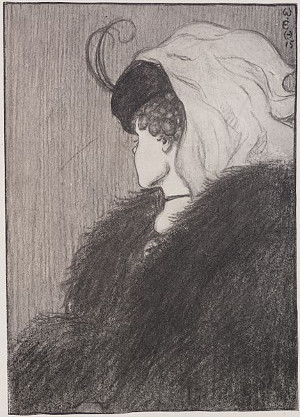
pentheraphobia
n. fear of one’s mother-in-law
Above: “My Wife and My Mother-in-Law,” from Puck, November 1915.
Asked what was the maximum punishment for bigamy, Lord Russell of Killowen said, “Two mothers-in-law.”
Enforced Rest
At a certain moment yesterday evening I coughed and at a certain moment yesterday I went to bed. It was therefore true on Saturday that on Sunday I would cough at the one moment and go to bed at the other. … But if it was true beforehand … that I was to cough and go to bed at those two moments on Sunday, 25 January 1953, then it was impossible for me not to do so.
— Gilbert Ryle, Dilemmas, 1954

